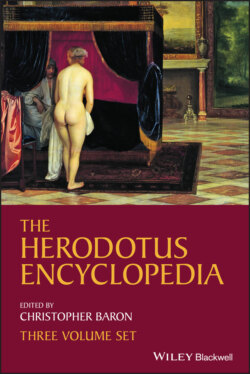Читать книгу The Herodotus Encyclopedia - Группа авторов - Страница 95
ADVISERS
ОглавлениеSHEILA MURNAGHAN
University of Pennsylvania
Herodotus’ expansive account of prodigious achievements and momentous military ventures includes many occasions for the giving of advice. The individuals and communities who drive historical events interact with human advisers of all ages and stations, named and unnamed, self‐seeking and disinterested, disreputable and high‐minded, whose ideas range from clever practical suggestions, to insights into the laws of nature and human behavior, to broad tenets of traditional wisdom. Those same actors also receive advice from supernatural sources through ORACLES and prophecies. A prominent theme within this larger pattern involves powerful figures who receive wise, usually negative advice but fail to follow it—with disastrous consequences, often recognizing their error after the event. The recurrent dynamic of resistance to advice and late learning is prefigured in HOMER’s depiction of HECTOR and Poulydamas in the Iliad and is a concern that Herodotus conspicuously shares with the tragedians, with the result that the typical wise adviser of the Histories is sometimes labeled a “tragic warner.” The definitive example of this type is SOLON in his programmatic encounter with CROESUS, in which Croesus is deaf to Solon’s warnings about the instability of fortune (1.30–33). When Croesus loses his empire to CYRUS (II) and voices his belated understanding by calling out Solon’s name on his funeral pyre, he saves his own life and himself takes on a new role as wise adviser to Cyrus and his son CAMBYSES (II) (1.85–89, 207; 3.36). Advisers may be recognized sages like Solon or BIAS OF PRIENE (1.27), experienced former rulers like Croesus or the deposed Spartan DEMARATUS (7.3, 101–4, 235), or well‐wishing ALLIES and relatives such as AMASIS (3.40), ARTEMISIA (8.68–69), ARTABANUS (4.83; 7.10, 46–49, 51), or GORGO (5.51; 7.239). Good advice is often ignored because of blind hopes and overconfidence, as in the case of Croesus, but other factors also come into play: in the extended account of XERXES’ decision to invade Greece (7.5–18), Artabanus’ initially successful advice to abandon the plan is overcome by the relentless momentum of Persian expansion, even when its pitfalls are recognized, and by supernatural interference.
A number of Herodotus’ wise advisers have affinities to the historian: the advice attributed to Solon reworks ideas found in Solon’s POETRY in line with Herodotus’ own views about ETHNOGRAPHY, East‐West conflict, human‐divine relations, and the limits of human KNOWLEDGE (Chiasson 2016); the Corinthian SOCLES provides an extended historical narrative in his attempt to dissuade the Peloponnesians from reinstating a TYRANT in ATHENS (5.92); Herodotus’ predecessor HECATAEUS serves as an adviser on several occasions (5.36, 125); and the Histories ends with Cyrus giving the Persians good advice on the Herodotean theme of topography and national character (9.122). This suggests that Herodotus may have envisioned his own work as wise advice aimed at the Athenians with their expanding empire, as many scholars have argued. In any case, Herodotus certainly articulates not only the dismay and self‐reproach of those who have ignored good advice, but also the frustration of those who have good advice to give but cannot change the course of events. On the night before the Battle of PLATAEA, an unnamed Persian observes that he and many of his fellow warriors know they are doomed but are constrained by NECESSITY to follow their foolish leaders, whom it would be useless to warn, adding that “the most painful thing in human life is to understand many things but to lack effective power” (9.16.5).
SEE ALSO: Athens and Herodotus; Decision‐making; Disaster; End of the Histories; Epic Poetry; Thersander of Orchomenus; Tragedy
